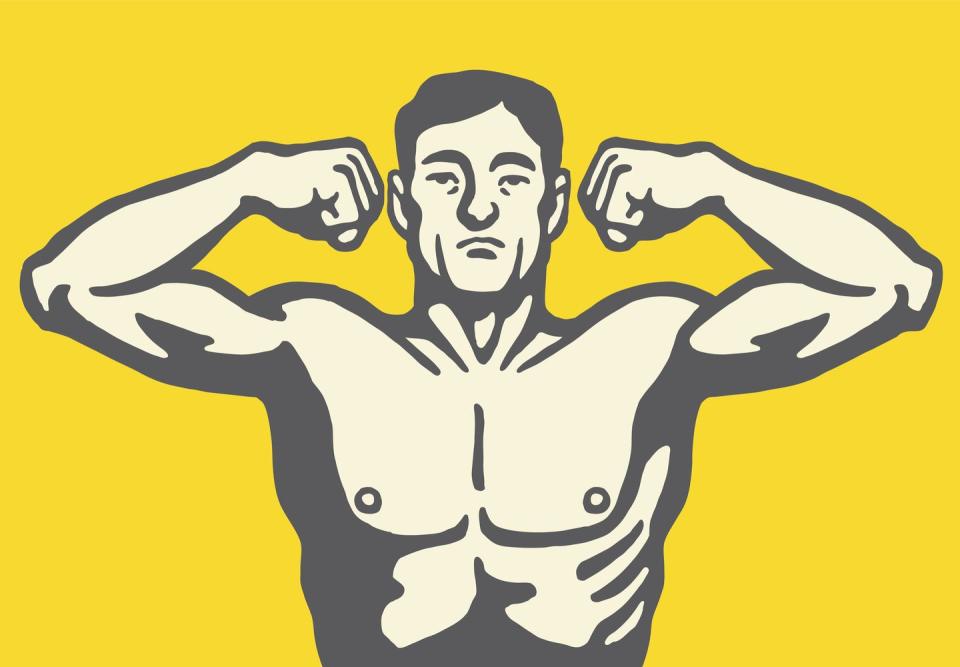Is your testosterone low? Take the ADAM test

Testosterone is a hormone that plays an important role in the human body, from affecting sexual arousal to sperm production. While everyone produces testosterone, it is the primary male sex hormone and men produce significantly more testosterone than women.
Testosterone production naturally decreases with age. However, if testosterone levels drop below the level they should, men may experience a number of symptoms associated with low testosterone, such as low sex drive, mood swings and fatigue.
We talk to men’s health specialist Dr Jeff Foster about the symptoms of low testosterone and how to increase testosterone.
What is testosterone?
‘Testosterone is the metabolism hormone,’ explains Dr Foster. ‘It is responsible for male sexual characteristics, but also has a role in protecting against cardiovascular disease, bone density, concentration, memory, mood, muscle strength and fat metabolism.’
Is low testosterone normal?
While testosterone levels are usually high for young men, production tapers off and a decrease in testosterone is a natural part of the ageing process.
‘In men, testosterone increases from puberty up until the age of 30, when it is generally accepted that there is a decline of about 1 per cent production per year,’ says Dr Foster. ‘This is an average, however, and the studies seem to show anything from 0.4 – 2 per cent.’
‘If your testosterone levels were naturally at the higher end of normal, you may never notice them drop,’ says Dr Foster. ‘However, if your levels are at the lower limit, it may not take many years before age related testosterone deficiency shows a clinical effect.’
Testosterone deficiency symptoms
Tired, overweight and feeling listless? While a decrease is a natural part of the ageing process, for some men it can lead to health complications.
Testosterone deficiency is also associated with low bone density, type 2 diabetes and cardiovascular disease, so if you are worried your testosterone levels might be low, it is worth getting checked out.
Symptoms of low testosterone include:
Decreased sport performance
Poor memory
For more information on testosterone deficiency, visit TackleTD.com

How to tell if you have low testosterone
Take the ADAM (Androgen Deficiency in the Ageing Male) test to check if you have testosterone deficiency. Answer YES or NO to each of the following questions:
Do you have a decrease in libido (sex drive)?
Do you have a lack of energy?
Do you have a decrease in strength and/or endurance?
Have you lost height?
Have you noticed a decreased enjoyment of life?
Are you sad and/or grumpy?
Are your erections less strong?
Have you noticed a recent deterioration in your ability to play sports?
Are you falling asleep after dinner?
Has there been a recent deterioration in your work performance?
If you answered YES to questions 1, 7 or any 3 other questions, you may be experiencing androgen deficiency (low testosterone level).
This questionnaire is not intended to replace a consultation with a healthcare professional. If you have any concerns, visit your GP. A testosterone test is a simple blood test carried out before 11am, with no sexual activity the night before.
Low testosterone treatments
Depending on the cause, your doctor can prescribe a testosterone replacement treatment to normalise your testosterone levels with a tablet, patch, gel, implant or injection.
Evidence suggests that with regular monitoring, testosterone treatment for men is safe, effective and relatively free of side effects when it is prescribed appropriately.
If low testosterone is lifestyle induced, then improving your health and fitness can have a positive impact on your testosterone levels.
Tips to increase testosterone naturally
Dr Foster recommends the following natural remedies to boost your testosterone levels:
Sleep is a major factor
We produce our testosterone in the early hours of the morning but only if we have had at least three hours of deep sleep. This requires a full night’s sleep to allow our bodies to produce it.
Eat adequate protein
Low protein can be associated with higher levels of sex hormone binding globulin, a protein which binds to testosterone and prevents it being released/used.
Don’t drink too much
Alcohol as well as many other medications including opiate pain killers are known to suppress testosterone levels and raise oestrogen.
Keep fit
Exercise naturally produces testosterone – there is no major difference in aerobic vs anaerobic exercise but it is the intensity that matters.
Stay in shape
If you are too fat or too thin, either extreme will push the body to reduce testosterone – starvation state means reduced sex hormone production, obesity means we suppress production through negative feedback and increased oestrogen.
Avoid supplements
There are no legal over the counter natural testosterone boosting supplements available.
Last updated: 30-10-2020
You Might Also Like

 Yahoo Finance
Yahoo Finance 